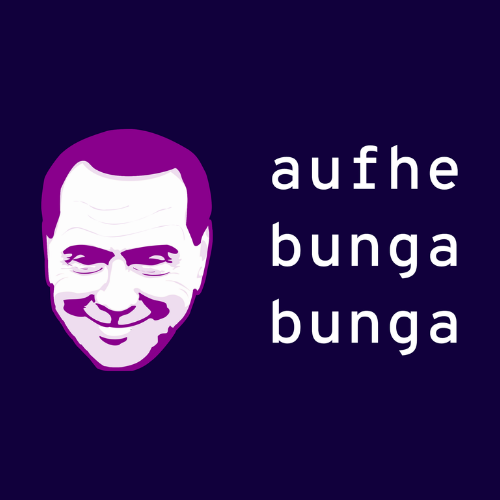Episodes
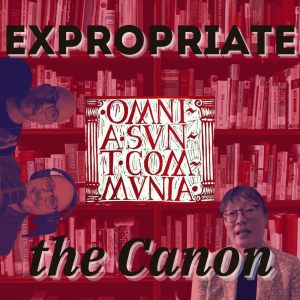
4 days ago
4 days ago
On the disaster of the culture wars.
Regular contributor Catherine Liu is back on to talk about her essay in Damage, issue 2, "Professional Populists in the Culture Wars". We discuss:
-
What were the original 'culture wars' and how are they different to today?
-
Why are the "academic populists" more elitist than anyone?
-
Was there a need in the 1980s to "disrupt" the humanities?
-
Why does conservatism now need to wear "populist" clothes?
-
How should we defend the "canon"?
-
What is the "Catherine Liu Foundation for Attacking Badness"?
Links:
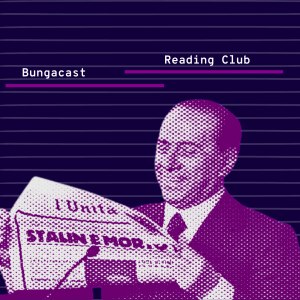
Tuesday Jul 16, 2024
/425/ Reading Club: Russia's Imitation Democracy (sample)
Tuesday Jul 16, 2024
Tuesday Jul 16, 2024
On the late Dmitri Furman's account of post-Soviet Russia.
Patreon Exclusive: for the Reading Club, join for $12/mo and get access to ALL Bungacast content, incl. 4 exclusive, original episodes a month
We continue our discussions along this year's themes (rise and fall of nations; Russia past and present) by tackling Imitation Democracy: The Development of Russia's Post-Soviet Political System.
-
Why has there been a revival in interest in the late Soviet and early post-Soviet period? And in the global 1990s in general?
-
What does it really mean to be without-alternative?
-
Why didn't democracy take hold in Russia? And why did it become an "imitation democracy" and not something else?
-
How was Yeltsin a disaster? And what was Putin's appeal?
-
Does 'Putinism' actually exist? Is it interesting or novel in any way?
-
What happened after Furman's death and Russia's turn to "violent parody of the West"?
Readings:
-
Imitation Democracy: The Development of Russia's Post-Soviet Political System, Dmitri Furman, Verso
-
Imitation Democracies: The Post-Soviet Penumbra, Dmitri Furman, New Left Review (pdf)
-
Imitation Democracy: Perry Anderson writes about Dmitri Furman’s analysis of Russia’s post-communism, Perry Anderson, London Review of Books
Listening Links:
-
/114/ Reading Club: The Light That Failed - on the end of the "Age of Imitation"
-
/270/ Russia vs the West ft. Richard Sakwa - on the endgame to war in Ukraine; and /271/ Russia vs the West (2) ft. Richard Sakwa - on the post-Soviet landscape
-
/410/ Reading Club: Deutscher's Stalin - On Isaac Deutscher's classic Stalin: A Political Biography
-
/421/ Who Are the Wrong Ukrainians? ft. Volodymyr Ishchenko - on post-Soviet Ukraine, from Maidan to war
Music: Éva Csepregi, "O.K. Gorbacsov", Hungaroton , WEA, High Fashion Music, Dureco
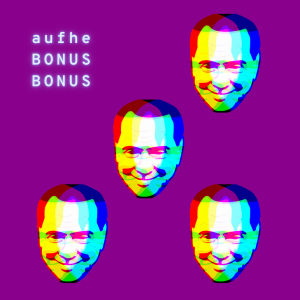
Friday Jul 12, 2024
/424/ Aufhebonus Bonus - July 2024 (sample)
Friday Jul 12, 2024
Friday Jul 12, 2024
On your questions & criticisms about fertility, culture war, and more.
In our monthly mailbag episode we take points from the discussion on patreon, including on futuristic music, holocaust movies, german populism, whether culture war can be global, and the link between modernisation, productivity and birth rates.

Monday Jul 08, 2024
/423/ Who Wants the 'Worst Job' in France? ft. Charles Devellennes
Monday Jul 08, 2024
Monday Jul 08, 2024
On France's surprise parliamentary election.
The left-wing 'New Popular Front' came a surprise first, for now putting a halt to expectations that the far-right Rassemblement National would soon enter government. We talk to political scientist and commentator Charles Devellennes, and ask:
-
What was Macron's gamble in calling this early election?
-
Is becoming Prime Minister actually a bad thing for your future prospects?
-
Is the Left actually 'far left' and the Right 'far right'? Is Le Pen a fascist?
-
Did the Left actually save Macron? Why not an alliance between Left and Right against the centre?
-
Will France opt for the undemocratic 'Italian Solution' and appoint an unelected technocrat?
-
Can Macron's party and his style of rule survive Macron eventually being out of office?
-
Does the uncertainty mean France is back to the postwar 4th Republic? Is this continuity? Something new?
Links:
The Macron Régime: The Ideology of the New Right in France, Charles Devellennes
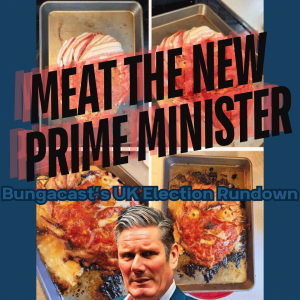
Sunday Jul 07, 2024
/422/ Meat the New Prime Minister: UK Election Rundown
Sunday Jul 07, 2024
Sunday Jul 07, 2024
On Labour's landslide and sandcastle majority.
We unpick what happened in the UK's general election, discussing:
-
How did Labour get such a large majority with so little enthusiasm for them?
-
Is the UK now a multiparty democracy, and will there be demands for serious electoral reform?
-
What accounts for low turnout and the fragmentation of the vote (Reform, Greens, Independents, etc)?
-
What is Keir Starmer's electoral base and how will he govern? What is their electoral programme?
-
Is Nigel Farage's reform the real opposition now?
-
Is the Brexit period now definitely over? Will there be a move to rejoin the EU?
Links:
-
The McSweeney Project, Tom McTague, UnHerd
-
Debasing Citizenship, Peter Ramsay, TNS
-
Data on the nationalist right + driving to work in the UK and French train stations
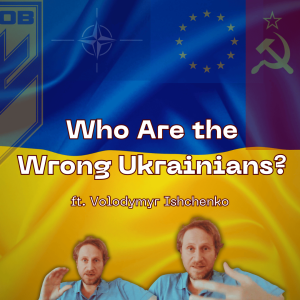
Tuesday Jul 02, 2024
/421/ Who Are the Wrong Ukrainians? ft. Volodymyr Ishchenko
Tuesday Jul 02, 2024
Tuesday Jul 02, 2024
Ukraine, from Maidan to war.
[For the full episode: patreon.com/bungacast]
Berlin-based Ukrainian sociologist Volodymyr Ishchenko joins us to talk about his new book, Towards the Abyss: Ukraine from Maidan to War and his dissection of the war and the underlying political crisis in Ukraine. We discuss:
-
class conflict in Ukraine as a legacy of the collapse of the USSR and the stagnation of the Brezhnev regime in the 1970s.
-
The role of the Ukrainian professional classes in the conflict and oversize influence of relatively small neo-Nazi and far-right movements
-
The meaning of ‘Soviet Ukrainians’ today and whether a neo-Soviet revival is happening among youth across the post-Soviet landscape
-
The difference between neo-Soviet revival and Eastern bloc ‘Ostalgie’
-
The concept of de-modernisation
-
The vicious post-Soviet cycle of passive revolutions and corrupt oligarchic regimes
Links:
-
Towards the Abyss: Ukraine from Maidan to War, Volodymyr Ishchenko
-
The crisis of Soviet Ukraine, Volodymyr Ishchenko, UnHerd
-
The class conflict behind Russia’s war, Volodymyr Ishchenko, Lefteast
-
Russia’s War on Ukraine Has Already Changed the World, interview w/ Volodymyr Ishchenko, Jacobin
-
As Ukraine Expands Military Draft, Some Men Go Into Hiding, NYT
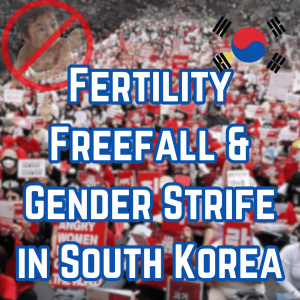
Tuesday Jun 25, 2024
Tuesday Jun 25, 2024
On baby bust, feminism and male resentment.
Alex and regular contributor Leigh Phillips call up Korean sociologist Hyeyoung Woo, director of the Institute for Asian Studies at Portland State University, to talk about demography, family and gender in the Republic of Korea.
-
How urgent is the national debate on fertility?
-
What policy measures have been introduced to reverse the decline?
-
How is work organised and how do long hours contribute to the lack of family formation?
-
What has been the impact of feminist movements in Korea?
-
Is there a male backlash against feminism underway?
-
Why is there such a huge gender gap in voting behaviour among the young?
Links:
-
The Real Reason South Koreans Aren’t Having Babies, Anna Louie Sussman, The Atlantic
-
Foreign maids and no military service: South Korea criticised over ideas to boost birthrate, The Guardian
-
South Korea's incel election, S. Nathan Park, UnHerd
-
This demographic catastrophe will hit us all, Peter Franklin, UnHerd
-
Korean Families Yesterday and Today, eds. Hyunjoon Park & Hyeyoung Woo
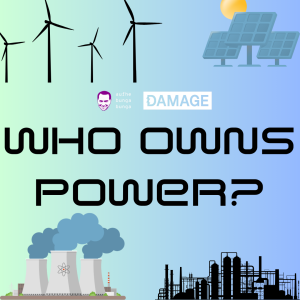
Thursday Jun 20, 2024
/419/ Who Owns Power ft. Fred Stafford (sample)
Thursday Jun 20, 2024
Thursday Jun 20, 2024
On the electricity grid and the institutions involved.
Fred Stafford, a STEM professional, a writer on energy and power, and an editor at Damage, talks to Alex and regular contributor Leigh Phillips about the utility of utilities and his recent essay in the second print issue of Damage, "Deinstitutionalized"./
-
What actually is a utility: is it a question of ownership, structure, purpose..?
-
How did the 70s energy crisis, neoliberal economics, and environmentalism create a perfect storm that broke up regulated utilities?
-
How does the regulatory regime on energy in the US actually work?
-
Why have environmentalists been so keen to line up with neoliberal deregulation and to attack utilities – in Europe as well as the US?
-
Why should the left think about a restoration of the investor-owned utility model, and not just jump straight to public ownership?
Links:
-
The Utility of Utilities, Fred Stafford & Matt Huber, Damage
-
Big Public Power from the Atom, Matt Huber & Fred Stafford, Damage
-
Power Loss: The Origins of Deregulation and Restructuring in the American Electric Utility System, Richard F Hirsch
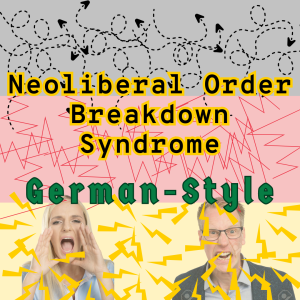
Tuesday Jun 18, 2024
/418/ Neoliberal Order Breakdown System, German-Style ft. Gregor Baszak (sample)
Tuesday Jun 18, 2024
Tuesday Jun 18, 2024
On German political derangement.
Independent researcher and writer Gregor Baszak joins us to talk about German centrism being squeezed under pressure from both left and right — Sahra Wagenknecht and the AFD. Meanwhile the German economy is getting squeezed between the US and Russia, and NATO pressures Germany to up its defence spending.
-
Is German public life remilitarising?
-
What are the prospects for Sahra Wagenknecht’s new ‘left-conservative’ politics?
-
What was the original political vision behind the Nordstream 2 pipeline?
-
Why are Marine Le Pen and Giorgia Meloni trying to carve the AFD out of pan-European national-populist cooperation?
-
Where does Germany now stand in relation to the Ukraine War?
Links:
- Europe After America, Gregor Baszak, The American Conservative
- What’s the Matter With Germany?, Gregor Baszak, The American Conservative
- The Left-wing maverick who could stop the AfD For many, Sahra Wagenknecht is a tribune of the people, Gregor Baszak, UnHerd
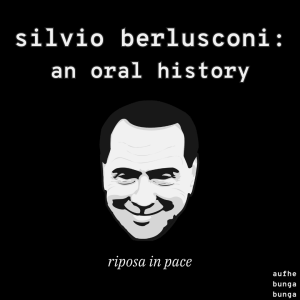
Wednesday Jun 12, 2024
/RE-RELEASE/ Silvio Berlusconi: An Oral History
Wednesday Jun 12, 2024
Wednesday Jun 12, 2024
On the one-year anniversary of the death of our evil patron saint, Silvio Berlusconi, we are re-releasing our audio obituary. RIP Silvio.
Former Italian Prime Minister Silvio Berlusconi died on 12 June 2023 at the age of 86. In this special episode, we say goodbye to the towering figure of the End of History, and explore how the contradictions he exemplified spoke to our age.
Contributions in order of appearance:
- Mattia Salvia
- Alice Oliveri
- Nadia Urbinati
- Carlo Invernizzi-Accetti
- Paolo Gerbaudo
- Thomas Fazi
- Pier Paolo Tamburelli
- The Bungacast Boys: Alex, George, Phil
Music:
- Bunga theme tune: Nous Non Plus / Bunga Bunga / courtesy of Sugaroo
- Rune Dale / Tell You Something / courtesy of http://www.epidemicsound.com
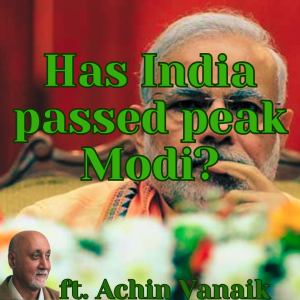
Tuesday Jun 11, 2024
/417/ Has India passed peak Modi? ft. Achin Vanaik
Tuesday Jun 11, 2024
Tuesday Jun 11, 2024
On India's election and a blow for the BJP.
Esteemed writer and social activist Achin Vanaik is back on Bungacast to unpick India's monumental, seven-week-long electoral process in which over 600m people took part.
-
How did the ruling Hindu nationalist BJP lose its majority?
-
Is there really a cult of personality around Modi?
-
How does the BJP differ in important ways from Western 'national conservatives'?
-
Does the BJP losing seats reflect a loss of support for Hindutva ideology?
-
Modi claims India will reach developed economy status by 2047. Is this true?
-
How bad are problems of under- and un-employment, especially for the youth?
-
What is the nature of India's "crony oligarchy"?
-
How does the National Population Register threaten to divest people of citizenship?
-
How does the BJP see Israel as an example for itself?
Links:
-
In State Repression and Its Justification, India and Israel Have Much in Common, Achin Vanaik, The Wire
-
Narendra Modi Is Preparing New Attacks on Democratic Rights, Achin Vanaik, Jacobin

Thursday Jun 06, 2024
/416/ Aufhebonus Bonus (sample)
Thursday Jun 06, 2024
Thursday Jun 06, 2024
-
How do ideas of victimhood relate to the material reality of international politics?
-
What really are the aims of the protesters and how likely are they to achieve them?
-
Are we cynical in our approach or conclusions?
-
How do the protests relate to populism and the end of the End of History?
-
What is the proper basis of nationhood?
-
How do these protests relate to the millennial Left?
-
Vulnerability as Ideology, Peter Ramsay, Northern Star
-
The victimological imagination, Matthew B. Crawford, Substack
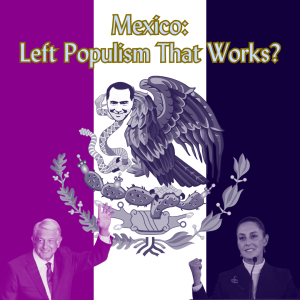
Tuesday Jun 04, 2024
/415/ Left-Populism That Works? (II) ft. Juan David Rojas
Tuesday Jun 04, 2024
Tuesday Jun 04, 2024
On MORENA and Claudia Sheinbaum's huge victory.
Mexico has elected its first woman president, tasked with extending the hugely popular AMLO'S legacy. What are her prospects and challenges? We ask:
-
What was the effect of NAFTA on Mexico, and particularly manufacturing?
-
How is US-China competition playing out in Mexico?
-
Why did Trump and leftist AMLO get along? What about Scheinbaum and Trump?
-
How does the politics of migration play out in Mexico?
-
How come there is no hardline Mexican right, especially given the problems of crime and drug trafficking?
-
Can other countries follow MORENA's example of centre-left success?
Links:
-
Mexico’s Political Revolution, Juan David Rojas, Compact
-
AMLO and Mexico’s Fourth Transformation, Juan David Rojas, American Affairs
-
Lessons of the AMLO-Trump Bromance, Juan David Rojas, Compact
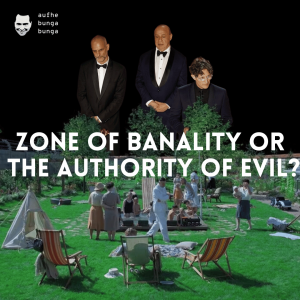
Friday May 31, 2024
/414/ Zone of Banality or the Authority of Evil?
Friday May 31, 2024
Friday May 31, 2024
-
How does the film fit in the pantheon of Holocaust films? Is it a Holocaust film?
-
How well does it deal with its obvious subject matter: the banality of evil?
-
Is the film neutral and detached or preachy, condescending, moralising?
-
What to make of the commentary around the film, including director Jonathan Glazer's statements? How does it relate to Israel/Palestine?
-
What to make of present-day Auschwitz? Should it be preserved?
-
The Zone of Interest is an extreme form of 'Holokitsch', Richard Brody, New Yorker
-
Is The Zone of Interest simply uninteresting? Toby Marshall, Substack
-
The Zone of Interest is about the danger of ignoring atrocities – including in Gaza, Naomi Klein, The Guardian
-
The Zone of Interest Reminds Us How Easy It Is to Ignore a Genocide on Your Doorstep, Juliet Jacques, Novara
-
The Banality of Evil is No Longer Banal, Maren Thom, Café americain

Thursday May 30, 2024
/413/ Left-Populism That Works? (I) ft. Roger Lancaster
Thursday May 30, 2024
Thursday May 30, 2024
-
What are the stakes in this election?
-
Has Mexico bucked the trend of class realignment? Where is the 'Brahmin Left'?
-
What is "republican austerity" and has this actually combatted corruption?
-
What do make of AMLO's use of the military? Militarising public life or domesticating the military?
-
What has AMLO done for the working class? And what might it do for itself?
-
What is AMLO's populism and has he rekindled class consciousness?
Links:
- The AMLO Project, Edwin Ackerman, Sidecar
- The Mexican Question, Ramon Centeno, Sidecar
- The Struggle to Be Gay—in Mexico, for Example, Roger Lancaster

